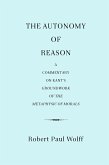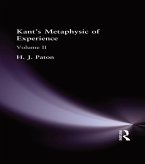To this end preliminary versions of the Analytic are actually presented, in formal step-by-step manner, four times in the course of the book. Finally, when the last elements of Kant's theory are revealed, a fifth and final version of the argument is presented. This consists of a proof whose premise is the Cartesian proposition, "I think," and whose conclusion is the Causal Maxim. In other words Kant provided a complete proof for the principle of causality, assuming only the minimal premise that man is conscious. In his presentation Mr. Wolff offers a refutation of the clam by some commentators that Kant's argument was merely hypothetical or regressive that is, starting with the conclusion and working backwards to the premise.
Although the main function of the book is to present this argument it also contains a considerable body of analyses, explanations, and speculations about difficult texts in the Analytic as a whole.
Dieser Download kann aus rechtlichen Gründen nur mit Rechnungsadresse in A, B, CY, CZ, D, DK, EW, E, FIN, F, GR, H, IRL, I, LT, L, LR, M, NL, PL, P, R, S, SLO, SK ausgeliefert werden.
Hinweis: Dieser Artikel kann nur an eine deutsche Lieferadresse ausgeliefert werden.









